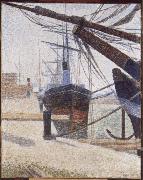
Oil On
Canvas, Real Flavor of Old Masters
|
Georges Seurat
|
|||
|
|
|||
| French Pointillist Painter, 1859-1891 Georges-Pierre Seurat (2 December 1859 ?C 29 March 1891) was a French painter and draftsman. His large work Sunday Afternoon on the Island of La Grande Jatte, his most famous painting, altered the direction of modern art by initiating Neo-impressionism, and is one of the icons of 19th century painting Seurat took to heart the color theorists' notion of a scientific approach to painting. Seurat believed that a painter could use color to create harmony and emotion in art in the same way that a musician uses counterpoint and variation to create harmony in music. Seurat theorized that the scientific application of color was like any other natural law, and he was driven to prove this conjecture. He thought that the knowledge of perception and optical laws could be used to create a new language of art based on its own set of heuristics and he set out to show this language using lines, color intensity and color schema. Seurat called this language Chromoluminarism. His letter to Maurice Beaubourg in 1890 captures his feelings about the scientific approach to emotion and harmony. He says "Art is Harmony. Harmony is the analogy of the contrary and of similar elements of tone, of color and of line, considered according to their dominance and under the influence of light, in gay, calm or sad combinations". Seurat's theories can be summarized as follows: The emotion of gaiety can be achieved by the domination of luminous hues, by the predominance of warm colors, and by the use of lines directed upward. Calm is achieved through an equivalence/balance of the use of the light and the dark, by the balance of warm and cold colors, and by lines that are horizontal. Sadness is achieved by using dark and cold colors and by lines pointing downwards. | |||
|
|
|||
|
|
The Harbour at Honfleur new19/Georges Seurat-278288.jpg Painting ID:: 54130 Visit European Gallery |
mk235 1886 Oil onc anvas 79.5x63cm | |
Height Width |
INS/CM |
||
|
X |
|
||
|
|
|||







